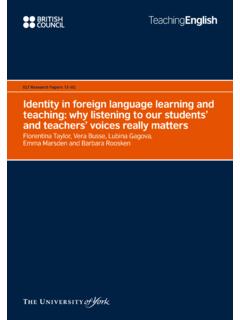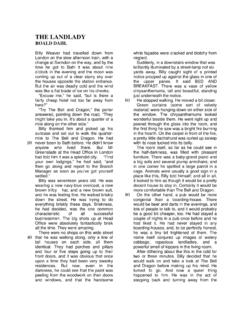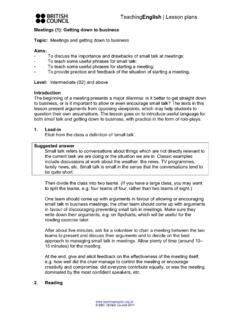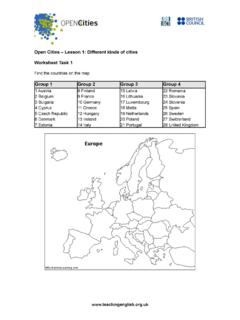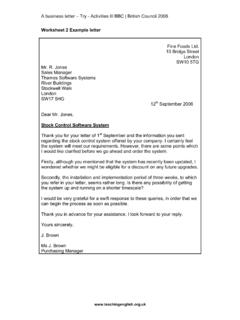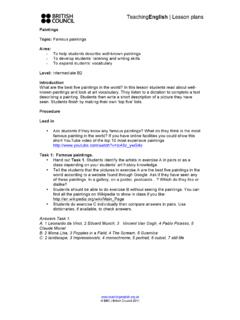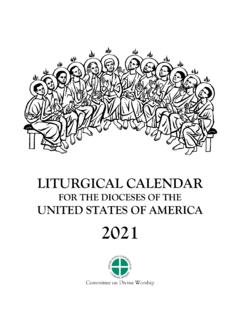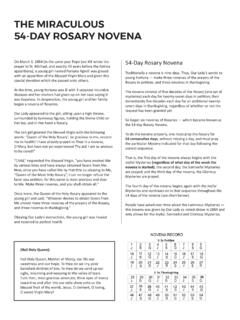Transcription of Lesson 2: Why do people migrate? Worksheet Task 1 - BBC
1 OPENC ities Lesson 2: Why do people migrate ? Worksheet Task 1 Read this quotation and discuss the questions: .. it is impossible to separate the globalisation of trade and capital from the global movement of people . (The Economist, 2002)1. Do you agree with it? Why/Why not?2. What are the effects of the globalisation of trade and capital in our society?3. What are the effects of the globalisation of people ?4. Are there many people in your city who were born in another country?5. How do people feel about foreign workers coming to your city?Of the billion people who populate the world, approximately 175-190 million live outside their country of Task 2 Task: Group AImagine you were moving to a new country.
2 What would be the most important factors to take into consideration? Put these in order of importance. Cinemas/theatres/concert halls Good flats/houses Good transport systems Good schools/hospitals/universities Presence of family/friends Safe streets Parks/green areas Free press and media Democratic system/equality Language Culture Other??? : Group BWhich of these things would most make you want to leave your home city or country? Unemployment Poor housing and services Poverty Famine War/unsafe social situation No job propects for your skills/qualifications Government persecution Discrimination Climate Geographical location Other?? Worksheet Task 3 Look at these pictures of people who have moved to another This is Zhihong Image by Veronica Vierin is Gip Image by Victoria Knysh This is Mamadou Image by Amy Chang is Chabela Image by Markel Redondo Talk about these pictures: What do you think?
3 What jobs do they do? Why did they move from their country of origin? What made them come to where they are now? Do you think they have better economic prospects where they live now? Why/why not? Are they happy where they are now? Do you think they will go back to their countries of origin? Worksheet Task 4 Listen to the people speaking and complete the sentences using the countries and cities Dublin Dubai India Bolivia SerbiaBilbao Sofia Madrid China Austria Bulgaria1. Miroslav is from _____ . He lives in _____ .2. Zhihong is from _____ . He lives in _____ .3. Gip is from _____ . He lives in _____ .4. Mamadou is from_____ . He lives in _____.
4 5. Chabela is from _____ . She lives in _____ .Which person ..1. _____ is happy about the children being employed?2. _____ works on a radio station?3. _____ married someone from where they live?4. _____ wants to settle down with a wife and daughter? Worksheet Task 5In your opinion, which of these people .. has the best job?.. earns the most money?.. is very happy to live where they live?.. live in the city for professional reasons?.. live in the city for family reasons?.. would like to go back to their country of origin? Task 6 Look at your person and try to imagine that you are that person. Tell your group about what you miss about your old country. what you like about your new city/country.
5 The negative things about living where you live. how you keep in touch with family and friends back home. the new friends and people you have met. your hopes for your children. your plans for the Task 7 Created using these statements true or false?1. The main movement of population is from developing countries to developed There are 4 million foreign born residents in Most OECD countries have a foreign population of between 5% and 15%.4. Many countries in the north would be unable to function without a large population of foreign read the text and find out if you were migrates Where to and where from?1. The main movement of population in today s world is from developing countries in the south to developed countries in the north.
6 people who choose to migrate usually move to richer countries than where they were born. people move to places where they think the quality of life will be better for This movement of population is inevitable and necessary. In the north, there is a shortage of young, skilled workers and the population is ageing. There is a need for younger people in these countries. In the south, on the other hand, people often live in under-privileged conditions with few opportunities. Many young people in these countries aspire to a better life and are attracted by the richer countries in the north. So, potentially, there is a mutual beneficial situation: the north needs young, skilled workers and the south has an abundance of young, skilled workers with few or no job opportunities.
7 3. Because of this population movement, the migrant population in most OECD countries is now between 5% and 15% of the total population. In some countries this percentage is even higher. In Australia, 25% of the population was born outside the country. In Canada 19% of the population is foreign-born. Today in Europe there are 33 million residents born outside Europe. In the USA, 35 million residents were born elsewhere. Russia, France, Germany and Ukraine have 5 million In a globalised world, this movement of population is inevitable. These days , many developed countries would not be able to operate without a large population of foreign Task 8 Read the text again and match the two parts of the 5% and 15%25% 19% 33 million 35 million 5 million The percentage of foreign born residents in Australia.
8 The number of foreign-born residents in Europe. The migrant population in most OECD countries. The number of foreign-born residents in the USA. The number of foreign-born residents in Russia, France, Germany and Ukraine. The percentage of foreign-born residents in Task 9 Read the text and then write the push & full factors in the right do people migrate ?There are lots of reasons for people to move from one place to another. There are factors that make some people s countries unattractive, and there are factors that make other places attractive. These factors have been called push and pull factors. Push factors are the reasons why people want to leave a place things that push them away from their place of birth.
9 Pull factors are the reasons why people want to go to one place rather than another things that pull them towards a place. Are these push or pull factors? Difficult living conditions Affordable house/flats Government persecution Unemployment Good economic prospects Good weather War or social unrest Safe streets Good schools and hospitals Poverty No job opportunities Corruption Presence of family and friends Cinemas, museums, theatres, concert halls, etc. Bad educational Task 10 globalisationdelicatessentradecapitalfor eign workera non-profit organisationPopulationOECD countrydeveloping countrydeveloped countryskilled workerpush factorpull factortransport systemunemploymentdiscriminationpovertyf amineeconomic prospectsjob cardsYour name is Eduardo.
10 You are from Ecuador. You live in Madrid and you work as a waiter in a central restaurant. Why did you migrate ?Your name is Fatima. You are from Morocco. You left Africa five years ago and now you work in Toulouse. You have your own business a shop in the centre of the city. Why did you migrate ?Your name is Magda. You are from the Czech Republic. Now you live in Birmingham in the UK. You work as a nurse. Why did you migrate ?Your name is Claude. You left Nigeria ten years ago and now you live in Italy. You work on a construction site in Naples. Why did you migrate ?Your name is Huan Tse. You are from China. You live in Munich where you study Engineering at university. Your parents run a restaurant in the same city.

